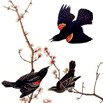Center, Internet, Wildlife Damage Management

Bird Control Seminars Proceedings
Document Type
Article
Date of this Version
10-1983
Citation
Proceedings Ninth Bird Control Seminar, Bowling Green State University, Bowling Green, Ohio, October 4-6, 1983. Ed. William B. Jackson and Beth Jackson Dodd
Abstract
From late July to early November 1979, 1980, and 1982, red-winged blackbirds were collected in sunflower, field corn, and at two roosts in Cass County, North Dakota. Their espophageal contents were examined, and they were also assessed for stage of molt. Both males and females contained a higher proportion of sunflower in sunflower fields than corn in field corn (P < 0.05). Male redwings consumed proportionally more sunflower and corn than did females. Females used more weed seeds than did the males. Redwing depredation in sunflower fields was highest from 26 August through 6 October, making up 71 % of male diets and 57% of the female diets. Foxtail seeds made up 17% of the male and 20% of the female diets during this time. In comparison, the proportion of corn found in red-wing diets was highest from 9 September through 6 October. During this time, male diets consisted of 52% corn and 37% weed seeds; females contained 22% corn and 75% weed seeds. These data suggest that red-wings are able to obtain sunflower easier than corn. Furthermore, weed seeds appear to be a viable alternate food source for red-wings. This food source may be especially important when the birds have difficulty meeting their dietary requirements from sunflower or corn. We suggest, therefore, that if sunflower were energetically expensive for red-wings to obtain, the proportion of weed seeds in their diets would increase. The annual feather molt of red-wings begins soon after nesting and is completed in 7-9 weeks (in North Dakota from late July through September). The process of molting and regrowing leathers is energy demanding. Red-wings are difficult to "move out" of the fields during molt; this is a time when sunflower need to be resistant to depredation.


Comments
Copyright (c) 1983 George M. Linz and Gregory Fox